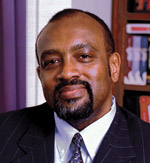
IRIS login | Reed College home Volume 96, No. 2: June 2017
Obama is no King
Brown University economist Glenn C. Loury delivered a rousing talk at Reed on Monday titled "Obama is No King: Reflections on Presidential Politics and the Black Prophet Tradition." (audio recording)
Professor Loury did not mince words in stating his thesis that while President Barack Obama's ascent to the Oval Office is historically significant, it is by no means the fulfillment of Martin Luther King Jr's legacy as a social critic and moral witness. He is skeptical of such claims because he thinks it is foolish and unrealistic for us to expect that Obama is on a "sacred mission of prophetic criticism." Though Obama the candidate rose up from a background of good works and activist sensibilities, Obama the president has little leverage for creating change when sustaining forward progress (e.g., "profits for the shareholders") is his primary charge. The role of commander-in-chief-must be viewed pragmatically; the office has its own imperatives, Loury maintains, one of them being the advancement of "the great imperial project" that is US government. He suggests that Obama is aware of the imperfections of democracy and that taking a stand on issues of racial inequality and poverty, as he did with conviction on the campaign trail, is no longer an option.
Loury asserted that Americans need to be sober about the limits of reform that the president can implement, but we should not quit fighting against racial subordination that is enforced by what is effectively an imprisonment-industrial complex. With stark data to support his views, he went on to talk about the incarceration explosion among minorities, the disenfranchisement of felons, and the failure of various government policies to solve social problems. Such "punishment" practices are wildly out of keeping with our country's own historical precedents, not to mention European rates.
Quoting Frederick Douglass' statement that "power concedes nothing without a demand," Loury wrapped up by concluding that an "implicit racial contract" is not to be renegotiated by President Obama because it requires "constant interrogation of institutions." The moral legacy of King and Douglass as outside critical voices cannot be realized by Obama precisely because he has had to bargain away any claim he had to this "sacred" tradition to gain validity in the "profane" business of being powerful. While Loury concedes that Obama's personal success story is compelling, he believes that Obama's rise to high office "fosters a false narrative of equality" that actually serves to undercut the prophetic tradition of bringing criticism to bear on the imperial project. Instead of lamenting that Obama didn't do it, we should be acknowledging that he couldn't do it.
Sponsored by the Walter Krause Economics Lectures fund, this lecture was also part of Reed's Black History Month. Loury, the Merton P. Stoltz Professor of the Social Sciences and professor of economics at Brown University, is a distinguished economist who has contributed to a variety of areas in applied microeconomic theory, including welfare economics, game theory, industrial organization, natural resource economics, and the economics of income distribution.
Black History Month concludes with a talk by Isabel Wilkerson, professor of journalism and director of narrative nonfiction at Boston University, on her book "The Warmth of Other Suns," this Saturday, February 25 at 7:30 p.m. in Kaul Auditorium. A Pulitzer Prize-winning journalist and best-selling author, Wilkerson spent years interviewing more than 1,200 people for this book, a work of narrative nonfiction that tells the epic story of the Great Migration through the lives of three individuals.
Tags: Black History Month, Obama, Wilkerson



LATEST COMMENTS
steve-jobs-1976 I knew Steve Jobs when he was on the second floor of Quincy. (Fall...
Utnapishtim - 2 weeks ago
Prof. Mason Drukman [political science 1964–70] This is gold, pure gold. God bless, Prof. Drukman.
puredog - 1 month ago
virginia-davis-1965 Such a good friend & compatriot in the day of Satyricon...
czarchasm - 4 months ago
John Peara Baba 1990 John died of a broken heart from losing his mom and then his...
kodachrome - 7 months ago
Carol Sawyer 1962 Who wrote this obit? I'm writing something about Carol Sawyer...
MsLaurie Pepper - 8 months ago
William W. Wissman MAT 1969 ...and THREE sisters. Sabra, the oldest, Mary, the middle, and...
riclf - 10 months ago